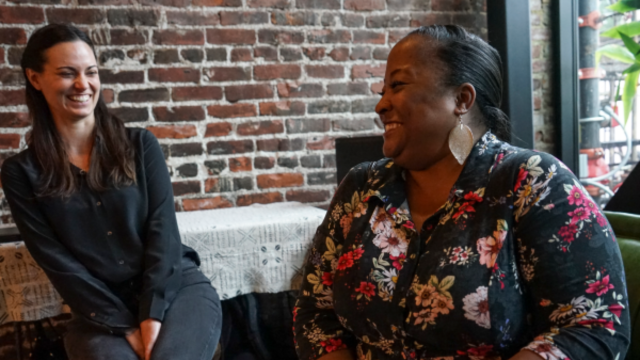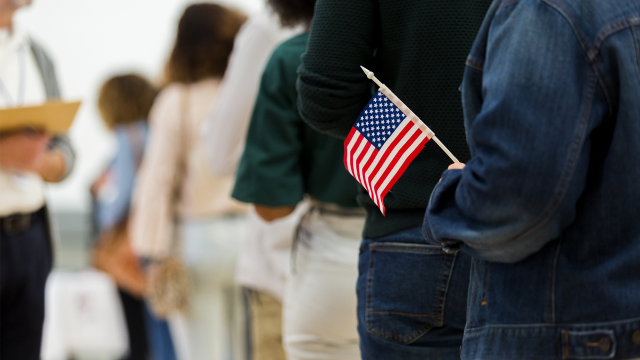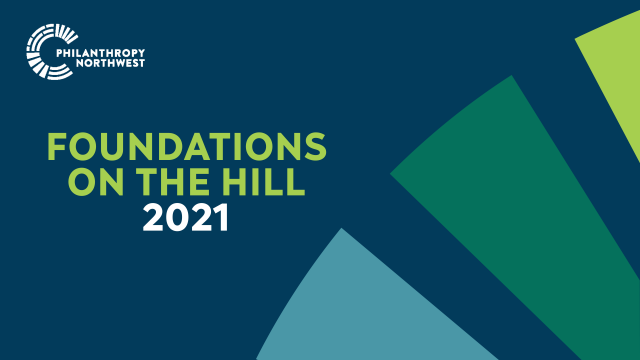Perhaps because I'm a New Yorker, Greek American and recovering journalist, I'm often struck by Northwest philanthropy's tendency to avoid conflict. Sure, it's nice when we can all agree before a decision must be made, but realistically? In any large group of stakeholders with competing priorities, it's rarely going to happen.
(You can't please everyone all the time — and that's OK. We can "have civil conversations, including strong disageements, without it becoming a political throw-down." Vu Le says so, and he's the polar opposite of a Greek NYC journo!)
Given my quasi-misanthropic perspective and our country's toxic political climate, however, I found myself pleasantly surprised by some common ground in our nation's capital during Foundations on the Hill, March 20 to 22. This annual gathering brings together philanthropy networks and foundation leaders to lobby federal officials on behalf of our sector (e.g., protecting charitable tax incentives) and our communities (e.g., offering Northwest data and examples to the Senate Committee on Indian Affairs). This year's FOTH delegations were much larger than usual: 230 participants, including 104 first-time attendees, like me. A sense of urgency, fueled by the president’s "skinny budget" proposal and efforts to repeal the Affordable Care Act, has prompted foundations that usually refrain from advocacy to speak up in defense of the arts, education, the environment, healthcare and underserved communities. Common ground? Standing for our missions.
The more experienced FOTH participants in Philanthropy Northwest's delegation confirmed that this year's agenda felt uniquely fraught with significance. "The tone is different now,” said Bill Thorndike, a Northwest Health Foundation board member. “We’re going through a disruption."
Under the Big Tent
In contrast to the regional philanthropy organizations representing a single state or metro area, Philanthropy Northwest spans a six-state cross-section of America: urban, rural, red states, blue states, international borders, high-skilled immigrants, refugees and asylum seekers, Native communities, public lands, corporate interests and everything in between. Our 2017 FOTH delegation included leaders from 12 foundations, with portfolios spanning all kinds of issue areas, support strategies and population types. This “big tent” served us quite well on Capitol Hill, securing meetings on both sides of the aisle. Common ground? A bipartisan group's message, such as the importance of protecting the Johnson Amendment, has a better chance of getting to the people who need to hear it.
Over the course of our three action-packed days on the hill — walking more than 44,000 steps, according to Fitbit! — our delegation talked with Sen. Maria Cantwell (D-WA), Sen. Steve Daines (R-MT), Rep. Jaime Herrera Beutler (R-WA), Rep. Pramila Jayapal (D-WA), Rep. Cathy McMorris-Rodgers (R-WA), Sen. Patty Murray (D-WA), Rep. Dave Reichert (R-WA), Sen. John Tester (D-MT), Rep. Greg Walden (R-OR), Sen. Ron Wyden (D-OR), legislative aides to several other Northwest lawmakers, the Senate Indian Affairs Committee, the Senate Committee on Finance and the House Committee on Ways and Means.
In addition to the philanthropic sector's concern about protecting charitable tax incentives, U.S. Census funding and the Johnson Amendment, supporting journalism emerged as a new theme this year. Philanthropy Northwest has previously hosted conversations about this with Media Impact Funders, the Gates Foundation and Rasmuson Foundation, but the White House attacks on journalism as “fake news” have provoked more interest from funders across our region and nationwide. As a panelist for a session on "Philanthropy and the Free & Independent Press," our delegation's Erin Kahn of Raikes Foundation inspired funders with examples of why and how her organization supports news organizations that cover vulnerable youth and families, education and greater Seattle, while the media outlets maintain editorial control over the content.
A Time for Tough Conversations
In between all our official Philanthropy Northwest delegation appointments, some of us also squeezed in separate meetings in D.C. I enjoyed checking in on my college friends who now work in the offices of Sen. Claire McCaskill (D-MO) and Senate Majority Leader Mitch McConnell (R-KY). Common ground? Unexpected career paths and a reminder that bipartisan friendships happened more naturally before the rise of social media.
Another first-time FOTH participant in our group, Danielle Garbe had great insights on navigating partisan waters. She served in the State Department under both the Bush and Obama administrations, before returning home to eastern Washington as CEO of Sherwood Trust in 2015. Common ground? The need for more conversations with rural and underserved communities — and a lot more listening, too.
“It was timely to be in D.C. just before Congress takes up tax reform to share our concerns about how potential changes to budgets and taxes could affect our communities," she said. "As someone working in small and rural towns, I wanted our representatives to know how much our region relies on local charitable giving and services provided by the nonprofit sector that enhance our quality of life. Our delegation also emphasized how much we value and want to protect our neutral and nonpartisan role to convene community members and encourage civic engagement.”
Some talking points that seemed to get both sides nodding in agreement:
- Do the math. What happens to our communities if the federal budget cuts funding for social services — expecting philanthropy to help fill the gap — while also disincentivizing charitable giving by changing the tax code?
- Nonpartisan is bipartisan. Northwest philanthropy includes very conservative and very liberal foundations, yet they agree on protecting the Johnson Amendment and funding the U.S. Census.
- Journalism matters. The United States of America was founded on the principles of freedom of the press, enshrined in our First Amendment. If we don't support journalism — whether it's through buying subscriptions, making grants or, at the very least, standing up for professional reporting when it's smeared as "fake news" — then we weaken the bedrock of our democracy. Our democratic process requires well-informed voters; philanthropy also has a stake in lifting up voices from the communities we serve.
- Nonprofits create jobs. The nonprofit sector isn't just charity and volunteers; it's a major segment of the U.S. workforce, coming in third behind retail trade and manufacturing. More than 10 million people are employed at nonprofit organizations, including foundations, making up more than 12 percent of the workforce in Alaska, Montana and Oregon. When we slash federal funding and programs that are part of vital public-private partnerships, this hurts American workers as well as underserved communities.
- Philanthropy cannot fill the gap. Total annual U.S. foundation grantmaking was $58 billion in 2015. While funders are highly motivated to invest in our communities, it’s impossible for philanthropy to cover President Trump's proposed $54 billion cuts to federal agencies and programs that support arts and culture, housing, human services, the environment, education and health. (The well-intentioned aide who suggested otherwise during a FOTH breakfast panel prompted a loud and clear chorus of disapproval, uncharacteristically led by the Northwest delegation!)
At the end of all those meetings, a few of us stayed late to attend the Philanthropy Caucus Reception, featuring an inspirational speech by civil rights hero and U.S. Rep. John Lewis (D-GA). Topping off my bipartisan adventures, I even managed a quick selfie with Sen. Bernie Sanders (D-VT) as he was boarding the elevator up to his office — at 7:30 p.m. on a Wednesday. Both men are in their late 70s and have experienced plenty of political upheaval over the years. They didn't shy away from conflict — they kept working hard and they keep moving forward.
Let's do the same.
Nicole Neroulias Gupte was Philanthropy Northwest's senior communications manager at the time of this post's publication.


